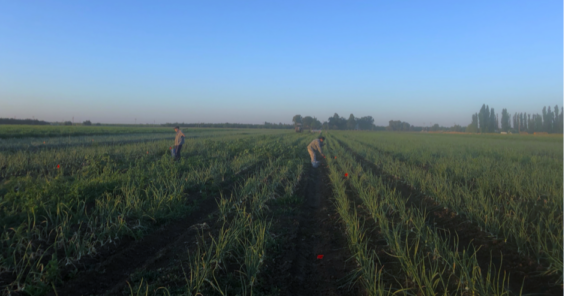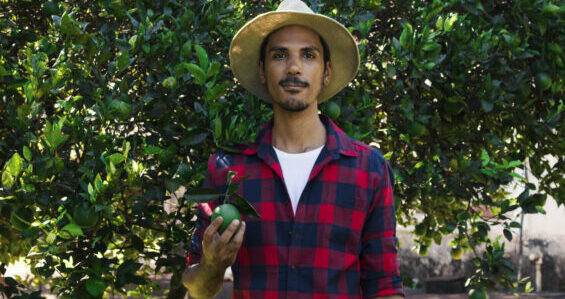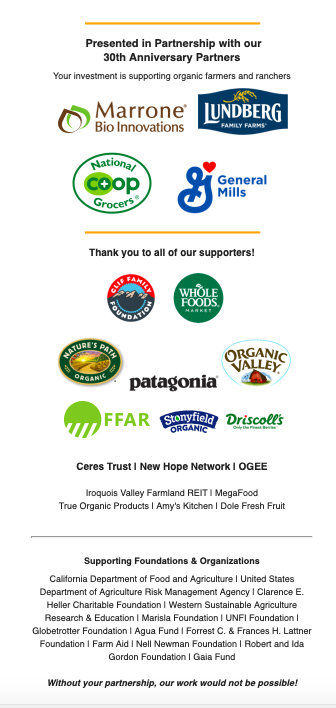
Farmer Spotlight #1, on the benefits of cover cropping, held in Woodland, CA with organic farmer Jim Durst and researcher Eric Brennan
November 10, 2020 – Building healthy soils is the foundation of successful farm management. However, efficiently managing soil fertility remains a challenge for organic farmers. Determining how much organic fertilizer to apply—and when—is a complicated process: too much can pollute the air and water, and too little limits crop productivity. In Yolo County, CA some organic farmers are reducing their reliance on organic fertilizer inputs by implementing diversification practices such as cover cropping, crop rotations, and intercropping to increase soil health and fertility.
These diversification practices add nitrogen to the soil in the form of organic nitrogen, which can then contribute to building soil organic matter. Organic nitrogen sources and soil organic matter must first be broken down by microbes living in the soil for nitrogen to become accessible to plants, in contrast to synthetic fertilizers or certain OMRI fertilizers like guano, which are already mainly available to plants as ammonium or nitrate. At present, it is difficult to quantify the rate at which nitrogen becomes available through the breakdown of organic nitrogen sources and soil organic matter. Most traditional soil tests were developed for conventional systems and measure only the amount of ammonium or nitrate sitting around in soil; they do not capture the dynamic flows of nitrogen released by microbes. As a result, it remains difficult for most organic farmers to determine when and how much nitrogen is available to their crops, especially if they are mainly relying on diversification practices to improve soil health and supply nitrogen.
To address this challenge, OFRF funded a project led by Assistant Professor Tim Bowles and Ansel Klein at the University of California, Berkeley to quantify the flow of nitrogen from soil organic matter to plants on working organic farms. The project team combined experiential knowledge of organic farmers with technical measurements of nitrogen flows in their soils to understand how varying levels of diversification affected the availability of nitrogen. In addition to assessing the extent to which organic farmers in this region rely on organic fertilizers, the researchers wanted to investigate how well traditional soil tests reflect the actual flow of nitrogen on diversified farms. They also aimed to facilitate farmer-to-farmer knowledge sharing of diversification practices that promote healthy soils.
By interviewing organic farmers who had already implemented a range of diversification practices, the project team developed a system to rank on-farm diversification for the 13 organic farms that participated in the study. Farmers who participated in this project incorporated varying levels of crop diversification in their fields. Not surprisingly, the level of plant-available nitrogen ranged greatly from farm to farm.
Due to a number of unforeseen challenges associated with the COVID pandemic and wildfires in California, the research team is still in the process of analyzing the nitrogen flow data. The researchers completed preliminary analyses that confirm their methodology works and they plan to use this approach to describe how diversification practices may be linked to how nitrogen moves through organic farms.
So far, the researchers were able to measure plant-available nitrogen directly and preliminary results indicate that some organic farms have low levels of plant-available nitrogen, despite having high levels of crop diversity. One explanation could be that much of the nitrogen in the system is tied up in soil organic matter and therefore is not detectable by traditional soil testing approaches. As the researchers continue to complete nitrogen flow lab analyses, they hope to shed more light on this finding.
In addition to lab research, Bowles & Klein also collaborated with organic farmers to create a farmer spotlight series where growers shared their insights into how to successfully implement cover crops and the importance of soil microbes for soil health. They are also finishing two podcasts in collaboration with The Farmers Beet, an agricultural podcast hosted by the Community Alliance for Family Farmers. Once data analysis is complete, production will begin on a short, informational video highlighting the outcomes of this project.
Results from the final report can be accessed here.
This article was written by Lauren Snyder, PhD, Education & Research Program Manager, OFRF






